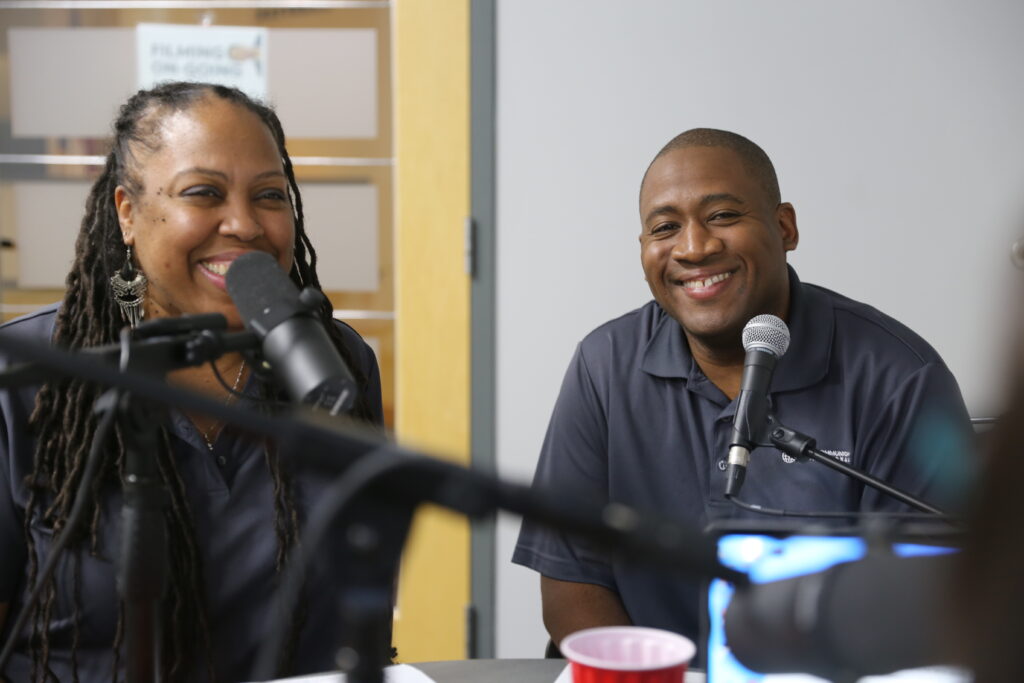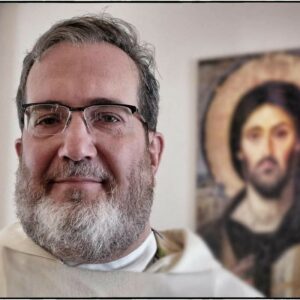Why the Church? w/ Dishon & Afrika Mills
Welcome to the GC Podcast, a podcast to help you develop into the healthiest ministry leader you can be by sharing practical ministry experience. Here are your hosts, Cara Garrity and Sarah Rossi.
Cara: Hello friends, and welcome to another episode of the GC Podcast. It is my pleasure to introduce you to Sarah Rossi, who will be our co-host for this quarter.
Sarah is a member and leader in the GCI church in Waltham, Massachusetts. And a member of the GC Next team in the Northeast region. Sarah works in the global health field in Boston and studies ways to effectively bring public health intervention to communities. And most importantly, Sarah is my dear friend.
Sarah, it’s great to have you join us here for GC Podcast. Now this episode is being released at the start of the new year. So across human experiences, there are many different traditions that honor the experience of new beginnings. What do you think, Sarah, makes new beginning so meaningful to the human experience?
Sarah: I think that new beginnings give us the opportunity to reflect on the past and to reorient ourselves towards our values. Sometimes for me, at least, life feels so distraught and new beginnings remind us that we can restart and change directions at any point, that we are not locked into our past or the narratives that we believe about ourselves.
New beginnings give us the push we need to start something new, the renewed sense of hope.
Cara: Amen. Thank you for sharing that. I love that idea of a renewed sense of hope. As we come into this new year, we will be focusing on the Love Avenue. And in today’s interview Afrika Afeni Mills and Dishon Mills share with us what they believe the purpose of the church is and how that shapes the Love Avenue.
Let’s listen to that interview.
Cara: Hello, friends and welcome to the latest episode of GC Podcast. This podcast is devoted to exploring best ministry practices in the context of Grace Communion, International churches. My name is Cara Garrity, and it is my joy to be your newest host of GC Podcast. It is an even greater joy to welcome Afrika Afeni Mills and Dishon Mills as my first guest to the podcast. Dishon is the lead pastor of a church plant in Charlotte, North Carolina, and the national coordinator of Generations Ministries in GCI USA. Afrika is the Director of Diversity, Equity, and Inclusion at BetterLesson.
More importantly, these are the folks who raised me from a baby GCI intern to now serving as GCI’s Development Coordinator. So, this is a special episode for me. Dishon and Afrika, thank you so much for being here with us today!
We’ll be discussing the foundational question of the purpose of the church. Why do we exist? But before we get started, I’d love to know how are you experiencing the hope of Jesus in this season?
Afrika: Well, thank you so much for having us, first of all. Because we just recently relocated from Massachusetts to North Carolina, for me, hope is feeling like really being able to build community. It’s a big move, I think. After growing up in New York City and going to college in east Texas, I spent most of my life in Massachusetts. So, relocating was exciting and also kind of nerve wracking. Right? I feel like what Jesus has been showing me is not only family members that we are blood-related to or I’m related to by marriage, but really being able to expand our community of people who are also believers and recipients of the love of Jesus and so that has been making me feel really hopeful.
Cara: Dishon?
Dishon: Hi, Cara, thank you so much for having me on the podcast. It’s really a great honor and privilege to be here. What’s giving me hope these days is this podcast and you, as the host of it. There was a time when, in our denomination, we did not believe that women could be teachers and leaders, and the fact that we have repented of that and we’re now having you as one of the voices of our denomination is a very hopeful step forward. And it has given me hope today.
Afrika: Yeah. I’d agree with that.
Cara: Well, thank you both for sharing. Why don’t we dive right in? Because this is a big question, the purpose of the church. So let’s start there. Dishon, what is the church and its purpose?
Dishon: We could spend several podcasts answering this question, but I’ll try to share a bit of what I know and I think I know so far. The church is the collective term for the freed people of God. God, in his freedom, sets human beings free, and those who accept that and are following that are collectively known as the church.
We are those who acknowledged Jesus as our king and our savior. And we follow him with worship and devotion. And I think the purpose of the church – there are several purposes, but one of the primary ones is to proclaim the good news of Jesus Christ in this present evil age, proclaiming that there is a source of hope, that there is a source of love, that there is a source of peace that is accessible to us. We bear witness in word and action of the kingdom breaking into our time, and that the kingdom is present, and it’s coming. And for that reason, we want to turn our hearts to Christ.
I think a couple more things come to mind. The church is ordained, preordained by God to do good works, that God has a purpose for us and work for us to do in this time and to participate in the ministry of Jesus Christ, to reconcile all things to himself, reconcile things to God and reconcile people to each other.
And the church has a big job. Unfortunately, our witness is imperfect because the church is made up of imperfect people. We make mistakes. We do not have full knowledge of God. We do not have our hearts completely transformed yet, but although the witness of the church is imperfect and flawed and always will be in this present evil age, it is still important and necessary because it turns people’s eyes towards Christ.
Afrika: I would agree with what Dishon has shared, and I am someone who – I’m a writer – so I think in terms of story a lot, and I’m compelled by a story. I think a lot of us are. So, what comes to mind for me when I think of the church is thinking about a different take on the movie, The Matrix, right?
For those of you who are familiar, and I was going to give a spoiler warning, but it’s an old movie, so I think it’s okay for me. I know that the next version, the next part of it is coming out soon. So, I think it’s fine to say. The main character, he felt like something was not quite right in the world and was offered the opportunity to take a red or blue pill: the red pill would be to discover what was really happening in the world and the blue would be to remain in ignorance. So, it’s not quite the same because for me, the purpose of the church is not as bleak as what he experienced when he took the red pill. But it’s almost, I believe, like that saying that talks about there’s a God-sized hole in all of us.
I think that really we know that there’s something more to life; there’s something different. And I think that the purpose of the church is to be aware and to become aware and to embrace the gift of God that he invites us into in relationship with him.
And then the other image that comes to mind for me too, is we recognize the invitation of God, and we’re sitting at this vast table that God has prepared for all of us and that we are the ones who invite those who are not yet at the table, to come and sit too, to come and see, right? Come and taste and see that the Lord is good. And so that’s what kind of comes to mind for me is an invitation.
And I agree with Dishon too; it’s hard because we are imperfect beings. We don’t do it perfectly, but I feel like, when we are at our best, we are those who recognize who God is and who we are in God. And we are excited and joyful, and we are extending the invitation to those who don’t yet know.
Cara: Amen. And I think in what both of you shared, there’s a connection here, even, to this next question that I have for you both. There’s something about the existence and the purpose of the church, that’s not just for the sake of the church, right? This idea of reconciliation to God and to others and this idea of invitation.
So, the ministry of the Love Avenue is that of witness, and there is this sense of outward movement or movement towards those who are not already part of the gathering church. What is the nature of that outward movement? Or to maybe phrase that another way, how does the church engage the world around it?
Afrika: For me, in the work that I do, I do quite a bit of work with educators and providing professional learning experiences to help to fortify and to give teachers what they need to make sure that students have what they need and deserve. And I think that a lot of it is about, unlearning some of the things that we have come to perceive as meaning, okay, this is what the church is. Because I feel like there’s a vast misperception by people who are not Christian – and people who are – about what it means to be a Christ follower.
For me, it looks like learning how to not see people as other, right? But to be able to see people as all God’s kids. Like when we think what Jesus talks about in the word that it is his desire, that all – right? – all should experience a relationship with him, and all should experience eternal life.
And so, then it can’t be that we’re looking at people as like, okay, we’re in this exclusive club and then other people are not. I think for me, it feels like really unlearning some of those ways, some of those individualistic ways and more into thinking more about, what does it mean to be a community of believers?
And so that’s the first thing that comes to mind for me.
Dishon: Picking up from what you said, I think even our language causes us to misrepresent and misunderstand what the church is. Where do we go on Sunday? We go to church. But the church is not a building. I think that causes us to have an inward focus as to what those who follow Christ should be doing. Where we go on Sunday should be a celebration, should be a gathering of those who are the church.
So, the outward focus, what we should be thinking about in the Love Avenue, I think is engaging our communities and our neighborhoods with full knowledge that Jesus is already in the world, that Jesus is already working, that we don’t serve our community because they’re such poor wretches and without us they’d be lost or that we have to bring Jesus to them. It’s an acknowledgement that Jesus already is already there. And to understand God, we have to go and work on mission and participate in the work that he’s doing. So that there’s a benefit to us to going out and loving our neighbors.
But beyond that, we get to engage them with humility, love, empathy. And be a force of good in our world, which is getting back to those are some of the good works that God has preordained for us to do that we should be ready and willing to participate in those things that God has for us.
Afrika: Is it okay if I follow up on something that Dishon was saying? You were saying that sometimes we think about church as the building that we go to on Sundays. I think too, then there can be a pendulum swing, where I’ve seen some folks who will say, “Well, no, the church is not the building; I am the church so I can do whatever.”
And I’m like, it’s not that either though. Right? Because there’s something really important about us gathering in community with one another, like we think about our Triune God has been in relationship eternally. Right? And so that has to be important, right?
That relationship piece between us is really key. So, it’s not about me privately, doing my devotionals on my own and reading the Bible on my own and watching or listening to podcasts on my own without gathering with other folks too. It’s really showing what relationship looks like, right? What does it mean to be, in a partnership, in a relationship with Jesus? It needs to be those types of relationships.
Dishon: Yeah. We have to stop – a lot of people think of themselves and they put the label of Christian on themselves and that’s more of a cultural label than it is a badge of being transformed. Jesus is the ultimate place sharer. This word “place sharing”, sharing the space, coming empathetically and dwelling in the same place as a person in order to be a blessing to them, to renew them, to make them whole. When humanity was lost, Jesus in his role as creator, in his role as the one who is restoring and recreating all things, place shared. He came and dwelt in our midst. He came and he became one of us.
So, to think that we can do otherwise is to misunderstand who Jesus is. We can’t do otherwise; we have to follow him. And that’s what he does. That’s how he does things. When he wants to see things renewed and restored, he enters that space. And it’s not him that catches our disease; we catch his health. Right? And he transforms neighborhoods and communities and people and individuals wherever he goes, and we are called to do likewise.
Cara: Yeah. I really liked that because even coming back to your image about, this blue pillar or this red pill, that there’s a different way, right?
That God’s people would also operate according to his ways. And we do that messily where we’re learning, but that is part of what it means to be his church. It’s his church as he’s created that his church as he’s becoming his church – or as he’s creating us to become, as we’re becoming his church, and as he is relationship, we also are going to be in relationship with each other. So, it’s not church as we define it. No, but church he’s made us to be.
Afrika: I totally agree.
Dishon: That’s right.
Cara: Yeah. I love that. So, what does that look like? You guys are talking about this particular, even, posture that we engage this world around us as the church. What does that look like for the church to live out this calling to be the church, not in a vacuum or in a little Christian bubble, but in the very context that church finds itself in our neighborhoods, our schools, our workplaces, our societies? Dishon, do you want to go ahead?
Dishon: Sure. I think there’s this misperception, that in order to be a Christian, we have to live in such a way where we’re very distinctive from the people around us. We have to sort of separate from the world. We have to talk in a certain way and wear certain clothes and listen to certain music. Right? So, we practice this churchianity.
And I don’t see that in scripture, right? When I look at Acts 2, I see a group of people following after Jesus, and the lines between those who followed Christ and those who didn’t, that line was incredibly thin. In fact, I see them gathering in the temple, the public square, the open space, the shared space of the community, and gathering there and celebrating life together.
And I see that circle overlapping the circle of those who did not follow Jesus. Right? And they were in each other’s homes, and they gathered together. And the Holy Spirit was adding to that group daily because you just couldn’t tell the line. There was no line. It was permeable. The folks who were not following Jesus were easily integrated into the circles of those who did.
And so, I think that’s what it looks like. I think it looks like us participating in the life of our communities intentionally, but not with an agenda. And what I mean by that is we’re not going there to try to make our pitch to follow Jesus first chance we get.
Afrika: Like with an ulterior motive.
Dishon: Exactly. Thank you.
We’re looking to build relationships that are authentic. But we also do that hopefully knowing that as we do, the Holy Spirit will move in our midst and create opportunities for us to share the good news about Jesus Christ.
And it’s also inviting people who don’t yet know who Jesus is into our rhythms. Invite them into sharing life with us, into our homes, into our gatherings so they can be transformed. Again, they’re not coming to hear a sales pitch and get pushed hard, but just to enjoy life without an agenda, without trying to force the issue, trusting the Holy Spirit to do [the] work. And as we do that, I think we’ll see things change.
Again, the church is imperfect. So, the goal is not to transform the world into the kingdom; only Jesus can usher in the kingdom. We’re not going to see the world completely changed because of the efforts of the church. But what we will see is that the name of Jesus is lifted on high, that we bear witness that he’s real and that there’s better ways of being. But it starts with us engaging in authentic relationships.
Afrika: A lot of times I feel like it’s just so simple. I think we complicate things unnecessarily. One of my favorite parts of the Bible is where in Galatians it talks about the fruits of the Spirit. For me, I think about, what does it mean to radiate the experience of those fruit? Right? What does it mean to, wherever we go, whatever relationships we’re in, whether we’re going to the salon to get our eyebrows done, or we’re going to the supermarket or we’re in traffic, how do we leave behind the aroma of the kingdom?
And not perfectly, like you said, because we do, we have hard days, we get frustrated. So those things will happen, but more often than not, I feel like it should really be that wherever we are, people should feel something special. That they had an encounter with someone special and it might be in passing.
A lot of times what I’ll try to do, and this is – I’m not taking credit for it because it’s something that God has encouraged me to do – is when even I make a phone call, is to ask the person, “How are you?” Genuinely. “How are you? How is your day?” It’s really to slow down to be curious about people. And to really, like you were saying, not in an inauthentic way or with some type of, my outcome, my goal is that I want to get you to come to this building. Right? But really is, I want you, I have been compelled by the love of Jesus.
And I want to be part of that as well for as many people as possible. And so, I think it’s just in the way we carry ourselves, our thoughts, our actions, our decisions, how humble we are, how vulnerable we are, how willing we are to make amends and to apologize. A lot of those things are rare. And so, when we do those things in relationship, I think it’s refreshing for people. And that’s because of God.
Cara: A transformed way of being.
Dishon: And I think in my experience, the people who have the hardest time with that approach is church folk. And I’m saying this is as someone who loves the church.
Afrika: Absolutely.
Dishon: There was a time when Afrika and I were planting [a church] up in Massachusetts and we were having these community dinners and trying to live this out, just inviting our neighbors to share a meal with us. And the people who were either disconnected from Christ or just didn’t know him at all, they loved it. They just flocked to it. It was a wonderful time.
But it was church folk that would come up to me and say, “Hey, are you going to get people to confess their sins and to accept Christ?” And I’m like “No, we’re just gonna eat these ribs, eat this salad and play these games.”
Because I think – I’m not sure, but I think – a lot of times we don’t value enough the power of helping people to experience the kingdom, versus always just saying and telling people things. I wonder how much more successful we would be in reaching people if we set a priority to help people experience the kingdom before telling them about the kingdom, letting them experience it, then explaining, “This is what happened to you. This is what you’re feeling. And this is why.”
Cara: Yeah. That’s good. And as a follow up to that, I’m even just thinking, in this idea of living out the calling of the church, right where we are, contexts are different. So, what does that look like to think about the context, where each church’s (GCI churches) contexts are different all across the world? So where do you start when thinking about what does it look like for this particular local church to live out its calling right where it is? Dishon, what are your thoughts?
Dishon: Again, I’m going to offer what I think and what I’ve seen and what I’ve experienced. But I think the community knows and values the congregation. I heard Michael Frost say in a speech that he was giving that if your church ceased to exist, the community should mourn, right?
It should be that integrated. So, whether or not the community knows and values the congregation, whether or not members of the congregation are using their gifts. Is it just a few people or is it everyone seeking to understand and use their gifts? The congregation meets the community where it is.
A lot of times churches can be in this mode of come to this event, come to that event. And they get frustrated when people don’t come, but that’s not what I see in scripture. When I look at scripture, I see Jesus going and meeting people where they are going, where they gather, going where they live their lives.
I think that’s another sign of a church living out it’s calling, where the church pops up, where the community already is. There should be an organized wildness to our congregations where ministry grows organically. It should be – as people are engaged in the community and seeking how to live out their gifts, their gifting – that ideas just pop up. We say, “Hey, we should do this, we should do that.”
There should be a certain wildness to our congregations. And sometimes ministries sprout up and sometimes ministries end. It should be a coming and going based on the moving of the Spirit. And so there should be that kind of vitality in life if we’re truly living this out.
And then the bottom line is, are we regularly seeking the discernment and guidance of the Holy Spirit to lead us in all ways? Not just over sort of large-scale decisions that affect the future of the church, where we pray those things through, but the small ones, right? Like how do we engage our neighborhood today? How do we engage our neighbors today?
I think churches that are living this out they say prayers like that. They pray over the smallest things, wanting the guidance of the Holy Spirit and submitting all they do to the Spirit. I think it’s very important.
Afrika: One of the connections that I make to your question is thinking about for me, when I was a classroom teacher and even in the work that I do in supporting educators now. Of course, it’s complicated. Everything’s complicated based on the pandemic, because place sharing has had to shift in a lot of different ways based on trying to be responsible and keep one another safe.
When we think about teachers and students or schools and students and their families, it’s similar to what Dishon was saying. A lot of times the perspective is, we’re having an open house, or we’re having conference night, we’re having literacy night or math night. And we want the families to come to this building to hear about what we have to say about your child. Right? There’s that approach.
There’s another approach where it’s, we do have some things to share about your child, and we could do it here, or we could do it in the community center, in your neighborhood, or we can do home visits. Right? We can come to where you are also.
And then on top of that, not only do we have something to offer you, we believe that your family has something to offer us as well. And I think that really resonates with me when we think about when we’re living out our calling. Part of letting the aroma of Jesus, like I was talking about earlier, is also finding out what God has put in them and what they like, how we can learn from them as well.
So, I think that’s the piece too. It’s not just about, oh we have this message to give you. And it’s yes, absolutely, very transformative and it’s necessary! And it’s also having a curiosity about what it is that we can learn from and how we can also be in relationship with the community as well. It’s so important.
So, I think a lot of times we miss out on that, because we don’t see the value of what God may already be doing, like what you were talking about before. And we’re not curious enough about that.
Cara: That curiosity and discernment kind of coming together. And I think that’s important even on a practical level because sometimes even when we have this heart of wanting to – yeah, we want to be in the community and we would want the community to mourn if our church was gone – we can still get in a copy and paste mode. Right? But neighborhoods are different! In one neighborhood, people might gather in the community center. In another neighborhood, they might gather somewhere else. What works in some place, might not work somewhere else because what God is doing in one place might be different than somewhere else.
Afrika: Yes, it’s distinct.
Cara: And so that curiosity and discernment, what is God doing here today?
Dishon: That’s right. And I think that has to be discerned in community. I think another thing that I see is a lot of times, churches say we’re going to go out to our community. Then it’s a bunch of individuals going out and doing things. Again, what I see in the book of Acts and in other places throughout scripture, what bears witness to Jesus is the love that we show for each other, as us in community.
In fact, to be the image of God, it took humanity, the totality of humanity, all the languages, all the different shades of skin, all the different eye shapes, all the different hair textures to reflect the image of God, right? It doesn’t take any one person or one group. So, when we do go out, we do so in community, gathering and sharing love for each other, and I think that’s what it is attractive to people. That’s what makes people ask questions? Like, why are you all so loving? How can it be part of it?
Afrika: I think we have to also be mindful (and this no disrespect to any praise songs) but Dishon and I talked about this recently, even our posture when we even sing a song, like “Greater things have yet to come and greater things is still to be done in this city.” Yes, and what does that mean though? Right? Is it something that we feel like God is going to do to people or that God is trying to do with people? And that’s a big difference, right? That’s a big difference.
When you talk about in communities, things happen differently, I think we also need to be aware of the history of that type of approach where it’s, we’re going to come and do this thing. We’ll take over and change this community. Because that’s happened a lot historically to different societies and peoples, and that’s not a good thing.
So, we’re not trying to – I don’t believe that’s how God operates. He is not a God who does to; he’s a God who does with, and that’s an important consideration.
Dishon: That’s right. Yes.
Cara: Absolutely. Absolutely. Oh, amen! Good stuff!
This is good. So, as we’re learning and as we’re bringing together curiosity and discernment and bringing this posture of being in our communities, what do you believe that we may start to see, as some of the signs that a church is beginning to live out it’s calling?
Afrika: I will say for me, you start to see a lot of trust. I think trust is such an important consideration because, like we were talking about before, so much of what we are doing in community is forming relationships. And there’s a lot of brokenness in the world, right? Because like we were talking about before, as human beings, we are not perfect.
We are flawed, and we do harm, unfortunately, whether intentionally or unintentionally. So, for me, I feel like you start to see gatherings of folks who have trusting relationships, where it feels like a healthy family. Right? You see each other, you’re at each other’s events, you’re going to kids’ games and performances and you’re going to movie nights together. You’re doing things in the community to improve things or to celebrate together. So, and I think there’s a lot of joy there.
Sometimes, I’ve been in different places, and it feels so restrictive and stern and there’s no laughter, there’s not a lot of like movement and celebration. That’s not compelling.
So, for me, I feel like one of the things that’s a really good sign of healthy community is that those relationships are really fruitful, and like I said, joyful! And it’s something that I think is contagious, because when you see people operating or relating like that, it’s like, oh, I want that too. Right?
I think a lot of us especially have become really aware during the pandemic, of that feeling of isolation and feeling disconnected from community. So, when community is good, it’s such a compelling piece. And then we are able to let folks know, yeah, this is – and we learn ourselves too – that this is Jesus. This is what God has intended for us.
Dishon: And I think I covered some things earlier, but I think one more thing comes to mind in addition to what Afrika just said. And this is kind of flipping the question, I think one of the ways in which we’ll see if the church is living this out is if those who are in power begin to oppose the church, because we’ve seen that historically. Jesus is the king of the upside-down kingdom.
And Jesus is good. He’s perfect. And because of that, the way he does things cuts against the way this world is oriented. And so, where Jesus is, there’s no hierarchy. Where Jesus is those who have gifts, so that those who do not have, will have, so all can have, right? So, Jesus comes in and changes the ways of being of the society.
And so, Martin Luther King talked about this in Letter from a Birmingham Jail. It used to be when the church stood up in a community, those who were in power started to shake because they know that where the church goes, the poor are blessed, right?
Afrika: Jubilee is coming.
Dishon: Right. Because where the church goes, the kingdom goes there too. And then those things get turned upside down. But we have to be concerned when the church comes to town, the power structures rejoice, right? When the church ceases to be a force of change, where it loses his prophetic voice, where it aligns itself with empire and power, instead of those who are valued least by our society, the least of these that Jesus talked about, right?
When the church starts to do that, then that’s when we start to lose our saltiness. That’s when we start to not be light. And I think that is something that should concern all of us. But yeah, I think part of what happens when the church lives out it’s calling are those that exist to hold onto power that has a result of oppressing others or subjugating others, they’re going to get uncomfortable.
Afrika: Start to get a little nervous.
Cara: Right. Because the kingdom is at hand, and so anything and anyone that may be threatened by the ways of the kingdom are a little uncomfortable. So that’s a side effect of the in-breaking of the kingdom ways as the church lives out, it’s calling. That’s good. That’s good.
We touched on this a little bit in terms of, how do we live out the calling of the church in our particular context. In the season, we are focusing on what it means to be neighborhood churches, the church right in our neighborhood. Is there anything in addition, that either of you would add in terms of what that discernment process looks like?
Particularly, you both are part of this church plant in the Charlotte neighborhood. Are there any, maybe even practical steps or advice that you would give to our listeners about the discernment process to live out the calling of the church in your neighborhood?
Afrika: Yeah. I was going to say that we talked a little bit about when we know that the church is operating in a healthy way that people are operating in their gifts.
For me, one of the things that I’ve been paying particular attention to is that I believe that God catches our attention about things that he has gifted us for and has put on our hearts to focus on. I think that in a lot of ways it’s like when you’re in a community or when you’re in the neighborhood, if there are things that are on your heart, connecting with those topics or those places.
So, for me, it’s the schools. And it’s different for me now because our own children are – our son is in his first year of college and our daughter is in her second year of college. So, this is the first year that we don’t have children in the K-12; they’ve moved on. Right? I don’t have that parental connection there, but I’m really very curious and starting to look into what’s happening with the schools in the community.
Are there ways that I can not only be of service or connect with what’s happening in the schools but are there things that I can learn from the rhythms of the schools and what they’re doing and not just, the elementary schools, but all of the schools, middle schools, the high schools too? And it’s an interesting time to be connected with schools, especially because we’re still in the midst of this global pandemic. Things are still hybrid-ish, so it’s not the same as it had been prior.
But I think it’s really starting to connect with, what is it that’s on your heart? And how do you connect with that part of the community or what’s happening there? And then just seeing what comes of it. So just really being curious. That’s my thing, being curious and being open to finding things out and learning from that, not just assuming that we already know, but going and just being in the space and seeing what’s happening there and then just really seeing what God would do as you’re joining into the rhythms of that part of the community.
Dishon: Yeah. I agree. I think a big part of this process is, I’ll call it “community mapping”, is that sort of looking at the needs and resources. And there’s lots of sources of information: schools, talk to the police fire department, local community-based organizations, nonprofits. These can all be really great sources of information.
And have informational meetings with these folks and say, “Hey, we’re just going to try and get a sense of this community. Can you tell us what you see? What’s coming down the pipe? What are the needs? What are the opportunities?” And having lots of conversations with lots of people in the community could be really helpful.
I think congregations need to also discern their unique purpose. Just like each person has been given gifts by the Spirit and is given a purpose, so too every congregation, I believe. I believe every congregation has a unique set of gifts that are to be used for the glory of God. And so, it’s important to sit down and say, “As a congregation, why are we here? What is different about us than the folks down the street, right? Why are we uniquely called to this place?”
And to actively have a conversation about that and be thinking about that. And then, have a real conversation about what of our available resources? What are we willing to put towards connecting with our neighbors? And I think somewhere between those three is – mapping the needs of the community, discerning the purpose of your congregation, your available resources – somewhere in there in the middle, there is your ministry focus.
And I think that should be what you really put your effort into. You need to set targets, so you just can’t have a focus. You have to say, okay, this is the change that we would like to see, and your targets need to line up with what you’re doing.
I’ve heard some congregations say, “Hey, we want to address homelessness.”
So, I say, “Okay, great. What are you doing about that?”
“Well, we’re handing out coats,” which is a good thing, but if I were to ask you, what is the most fundamental need of someone who is homeless? It is a home.
So, you can say that you’re trying to be compassionate and helping people get through the winter. That’s a valuable thing to do, but you can’t say, we’re addressing homelessness. Right? Because you’re not giving, you’re not addressing the fundamental need of someone who’s homeless. So, I think we have to ask questions about what outcomes are we seeking?
And the last thing I would say is that because of this process and because of who we are as the church, we need to check our biases. And ask questions: not only who are we serving, but who are we not serving and why? Are there folks that should be at this table that are not? Are there voices that should be heard that aren’t being heard, and why is that?
Because we always will gravitate towards the comfortable, we will always gravitate towards the safe. And sometimes we have to ask ourselves, well, why is that? Is there another dimensions to this that God is asking us that we’re not hearing because of our biases?
Afrika: And the other thing that comes to mind too is – and I know some people have very strong feelings on one side or another, or maybe in the middle about the use of social media. One of the things that I’ve noticed though, is that yes, I think like with anything, there’s going to be parts of social media that can be challenging or not the most productive or healthy.
But since moving to the area, I’ve joined the Facebook group for the community or the Next Door app to see what’s happening. And of course, there’s some things that are in there just like, okay, all right, so this seems like you’re being a little bit insular and not really wanting people to come to you, seeing it as just like a closed community and you don’t really want other people in. All that’s on there.
Though, there are some people who are expressing needs or expressing the desire to connect. And I think that really being able to use that, use the opportunity to connect with people who are sharing things. I think about a couple of weeks ago, someone shared, “I’m starting my life and I’m just getting my first apartment. And if anyone has any furniture to donate, cause I don’t really have the money to furnish the home myself.” That’s an opportunity to really be of service, but then also to be in relationship potentially. So not seeing social media as a complete negative but seeing what are the ways that we can expand on our connections in our community based on what people in the neighborhood are sharing there.
Cara: That’s good.
This has come up, as we’ve talked, we are not perfect human beings. And so, this can be messy as we learn and we grow by the Spirit. And so, responding to God’s calling on his church, it’s not formulaic or a linear journey. It is full of repentance and renewal, transformation in Christ.
What advice do you have for our listeners who are on the journey of becoming who God has called his church to be?
Afrika, do you want to?
Afrika: Sure. I mentioned this a bit earlier too, and I think it’s still pertinent for this question, is really hearing from God and trying to unlearn some of the ways of being that we have formerly learned.
So, in order to be in community with one another, it does require for us to think differently than how a lot of us were brought up or how a lot of us are encouraged to be in this society or in this country. I’ve thought in some of the work that I’ve done about what the differences are between being individualistic and being a communal people.
When we think so much about ourselves, then that’s counter to what it is that God’s trying to do with us. So that is something that I’ve been trying to focus on and trying to see, okay, well, I don’t have to do all these things individually. I don’t have to appear a certain way. If I have questions or struggles, I can be that person, that I can be my true self, because that’s who God, he invites me to be Afrika. He created me, right?
And then thinking about, how do we create that type of space too? How do we form community and come a bit away from that individualistic perspective where we’re just having to be alone and trying to perform for God? Because that’s not what God is looking for. It’s about us connecting with other folks too and really being able to shape life together. So, that’s something that really kind of jumps out at me.
Dishon: Yeah. I think we have to embrace the mess and imperfection of the church. I think it can be natural that as your mind is renewed, to look back at people who think how you used to think, and see them in a very negative light, right? There’s a movement now about deconstructing our faith. And in some ways, I think that is a very healthy conversation because I think we need to take a look at the ways in which our social, diseased imagination has affected the way in which we worship Jesus. Because things like racism and sexism and other isms have affected the structures of the church, the way in which we organize ourselves, and the way we conduct ourselves collectively. Those things have been impacted by those isms.
So, the extent to which the church has aligned itself with power versus align itself with its purpose and in seeking empire instead of seeking to be salt and light, we do need to ask those difficult questions. But deconstruction is only part of it. You have to build something, right? You have to build something up. We can’t just tear down.
And so, we should be seeking to remove harmful things to foster more growth. And we have to trust that God has the long view. Part of what my hope is for those who are on this journey would be to realize that it is the flaws of the church that help make it beautiful.
It’s in the imperfections that help the church testify even more to the goodness of God. I mean, we are those jars of clay. They’re broken and put back together again, and the light shines through those cracks in us. As people look upon us and we say, “Hey, you know we’re people, we’re the church, we don’t have it all together, but there is this Jesus who is just so wonderful. And he’s putting me back together even now, and he could do the same thing for you.” That is the beauty and power of the church.
So, I would ask people that are on this journey to meditate on why Jesus still has scars. Why does he still have those blemishes? They’re beautiful. And the church’s imperfections and its scars and blemishes should add to our beauty, not take away.
Afrika: It brings up for me the now and the not yet. I think if we really leaned into that, that would be such a more helpful place to be. I think back to myself, in my earlier walk as a Christ follower, in the beginning, it was so performative.
It was like, okay, I have to have this checklist of all these things that God doesn’t want me to do. I’ve got to make sure I don’t do those things. And then there’s some stuff he wants me to do, so I gotta make sure I try to do that stuff. And then he’s going to love me, right?
So, if we think of it that way, it’s as if it’s totally missing the relationship and what God intends to be the transformative process. I think about that too if we were more candid and vulnerable about that, it’d be like, no, we haven’t arrived. It’s not like I am this saved person and you’re a sinner. It’s like, yeah I’m still in the process of becoming, as we all are.
So, I think that is so important for us to be able to [say], “Yes, we are broken. And Jesus is healing, and he is embracing, and he is changing me. And let’s do this together.” It’s not like, I’m looking at you from some mountaintop, right? We’re walking alongside one another.
Cara: Amen. Well, as we do learn to be the church for the world and in the world, and not just in our safe little Christian bubbles, I not only imagine, but I guarantee we’re going to encounter some difficult questions and conversations. What advice do you have for those of us who might be hesitant to engage particular matters of the world and human experience with the gospel because they might be too messy or hot topics? Dishon, you want to go ahead?
Dishon: I’m speaking for myself. And I think others may be like me as well, but I think we need to learn how to lament. And lament is a spiritual practice that we don’t talk about that much. But if you look in scripture, it’s absolutely necessary and vital. And from start to finish, cover to cover in the Bible, the people of God lamented. And this is crying out to God in our brokenness and naming our complicity and sins of omission and sins of commission, and admitting that we have no other help but God and only God can renew us and make us new and give us a new heart.
And I think as we encounter different types of people, instead of doing the visceral reaction of when we encounter something that makes us uncomfortable, pull away, I think what we need to do is lean in and let our hearts break. Let our hearts break for the disunity of humanity, let our hearts break for our disconnection from God, that we don’t even know that we are made in the image of God anymore.
People don’t even know that they are blessed by the divine. I mean, they don’t even know! And we should mourn these things. And I think that part of what it means to be human is to place share and allow ourselves to be shaped by the story of others.
And unless we’re willing to sit in lament for a little while and admit even our own complicity with the way things are, how we’ve contributed things, we can’t move forward in our reconciliation efforts, right? We can’t participate in that ministry of reconciliation, whether it be to reconcile the church to people who are not yet in the church or folks who are not yet in the church to God or any variation of those things. So, I think one of the first things we need to do is learn how to lament.
Afrika: There’s a Ted Talk that I really, really like by Chimamanda Adichie and it’s called The Danger of a Single Story. And I highly recommend for people, if you haven’t watched it, I highly recommend it. But basically, the gist of it is that we can tend to look at one another in a very myopic way.
We see one another as one thing, as opposed to seeing each other as dynamic people who are way more than one thing. And so, I think for me in my – like you said, you’re speaking personally – in my journey, it’s been important for me to ask more questions and to hear from people as opposed to assuming that I already have someone figured out. Because I don’t!
There’s some stuff I know because of God’s grace and from lived and learned experiences, there’s a ton that I don’t know. And there are things that I don’t even know to ask because they’re not part of my experience. There have been things that I think in previous, earlier parts of my journey as a Christ follower, where I was like, well, that thing or person’s choice is wrong and that makes them a bad person. And I have to stay away from them because I have to be unspotted by the world and I can’t blend together; I’m a called out one. Right? I think there’s a continuum in our journey as Christians. I think there is a place for that, where we can kind of grapple in that space, but that it’s really important that we not stay there and to know we don’t have God all figured out.
And there are some things that we may have even read in scripture that we had the wrong impression of. Speaking as a woman, for a long time, I was really, I was kind of irritated with Paul because the things that I was told that Paul espouse doctrinally about women seemed kinda messed up.
And so, it really kind of hindered my relationship with even – I mean, he wrote a lot of the New Testament, so it was a struggle for me. And then when I started to understand the context of some of the things that he said, that they weren’t quite what I was being told that they meant, I’m like, oh, okay! So, then I have a deeper understanding of it because we have these conversations and explore what I think I know.
So, I think that there some part of that as well, that there are some things that we have been told and some things that we think we know that we should have a bit more questions and openness to hearing from people about, and not assuming that we already understand someone or someone’s journey.
And not seeing someone as the one choice that they’ve made. In the case of some of the things that we tend to affiliate ourselves with politically, it’s not just about someone’s choices that they have made or who they say they are. They are children, they are God’s creation. I think that we really need to focus a bit more on that than thinking about how we need to be separate from people.
Dishon: Yeah. Humility is what you’re talking about, being more humble.
Afrika: Right.
Cara: Yeah. That’s good. Well, is there anything else that we haven’t covered or that I haven’t asked that you would like to share before we bring our conversations to a close today?
Dishon: Cara, I’m exhausted.
Cara: Alright, well! Like I haven’t made y’all do enough work!
Well, before I let you off too easy, in keeping with the tradition of my predecessor, Anthony Mullins, I am going to ask you both a series of fun questions and you’ll answer the first thing that comes to mind. Are you all ready?
Afrika: Yes, I’m going to try not to overthink this.
Cara: Marvel or DC?
Both Afrika and Dishon: Marvel.
Cara: Easy, good answer. Is a hotdog, a sandwich?
Both Afrika and Dishon: No
Cara: Good answer. What is your biggest pet peeve?
Afrika: Oh for me, I mean, the first thing that came to mind and this I’m admitting that I really like to drive fast. So, if I’m driving on the highway and someone ahead of me is driving slower than I would prefer, I struggle with that.
Dishon: Hats that I perceive as goofy or silly. I’m pretty judgy when it comes to hats.
Cara: If you had to delete all but three apps from your smartphone, which ones would you keep?
Afrika: For me, I have the Voxer app. It’s like a walkie-talkie app that I use to keep in touch with friends. I would definitely keep Voxer. I would keep WhatsApp because that’s how I am seeing our daughter who was in college because she doesn’t have an iPhone, so I get to see her face through WhatsApp. And I’m trying to think what the third will be. It’s like there, there are probably some social media ones that I would keep, but it’s hard for me to say that cause I’m like, I’m trying to like, not be so addicted to them. So, I guess I would keep my email app because I do enjoy communicating that.
Dishon: I would keep Hoopla. I guess I would keep the texting app so people could get in contact with me.
Cara: That comes with the phone.
Dishon: There is this app to help me shop at the grocery store that keeps my lists together, which is very key or else I’d just be walking the aisles aimlessly. And my Bible app, of course.
Cara: No, I’m offended. Neither of y’all said Pokémon Go, but you had to say the Bible app.
Afrika: But my Pokémon experience since I’ve moved here has been a little bit hard.
Cara: It’s all right.
So, imagine you have your own late night talk show. Who do you invite as your first guest?
Afrika: Oh, this is easy for me. I so fan-girl Ava DuVernay. I love her work and she’d be my first guests absolutely.
Dishon: Banksy!
Cara: That’s tricky though. That’s a work around, right?
Dishon: If he would come, that would be amazing. I would have my first show be the highest rated show.
Cara: The identity of Banksy revealed!
And last question. When you were a kid, what did you want to be when you grew up?
Dishon: I wanted to be a chef.
Afrika: Ooh. Because I wanted to be a lot of different things, but I think being a writer is something that’s been interesting to me for a long time.
Cara: Amen! Cause you’re doing it.
Afrika: Yeah, I am. It’s pretty cool.
Dishon: Now I feel bad. Now I got to go to culinary school to keep up.
Cara: Nah, pastor’s an alright calling.
Afrika: Yeah, and you hold it down pretty well with the cooking.
Dishon: Thank you. I appreciate it.
Cara: Well, thank you both for taking your time to join us today. It was a rich conversation, and I think our listeners are going to have a lot to chew on, to pray through, to discuss with church members and leaders. And to close us out for today, it is our practice with the GC Podcast to end our show with a word of prayer.
So, Afrika, would you be willing to pray for our churches, pastors, ministry, leaders, and members today?
Afrika: Absolutely. Absolutely.
Father, Son, and Spirit. We thank you so much for this opportunity to share time, to share space, to connect and talk about you and to talk about who we are in you, Lord. We’re just so grateful for all that you are to us and with us and all you have created us to be for one another.
Lord, I just pray for all that are in your service. We know that, especially during these times, they’re very unique times we’re living through right now with a lot of challenges that we have not experienced in this life previously. And so, we pray, Lord, we know that you understand us. We know that you are compassionate.
We know that you equip us Lord and that you provide us with the space for healing and comfort when we need it. And you give us those times, like Elijah under the tree where you feed us, and you invite us to nap and be rested. And then you also fortify us through that time. And so, we pray Lord that you would help us to continue to rest, to really just to sit under your wings, God, and to really enjoy time with you and to also use those times to be propelled forward as we hear from you, what you would have us do, who you would have us be, how you would have us be, and who you would like us to be in relationship with, Lord, and what you have prepared us for such a time as this.
And we’re just so excited, Lord, we’re so excited. We’re so grateful. We’re so grateful for your love and we just express our gratitude to you, Lord, and we are thankful to be able to continue on in our relationships with you and with one another. And we thank you for all these things in Jesus’ name. Amen.
Cara: Wow. Afrika and Dishon shared a lot of good stuff in this interview. I particularly appreciated the practice of curiosity that Afrika mentioned. What jumped out at you, Sarah?
Sarah: I really resonated with Dishon’s comment about the need for church folks to move away from the perception that there needs to be this divide between us and the world. He mentioned that in scripture, the circles between those who follow Christ and those who did not overlap quite a bit.
And I think that also connects well with Afrika’s comment that we need to unlearn what we think the church is and not see non-Christians as other, but as all of God’s kids. She posed the question, what does it mean to be a community of believers? And I want to reflect upon what does it mean to be a community of people from all beliefs and backgrounds without ulterior motives.
Cara: Thank you. That is a rich question to reflect on. And even as we come into this new year and embrace this idea of new beginnings, can we embrace a new way of thinking about community, a new way of thinking about a community of people, as you say, from all beliefs and backgrounds without these ulterior motives?
Thank you for sharing that, Sarah. And I hope that our listeners reflect on that question.
We do, in GCI, have a lot of great resources that are available as we learn and grow in ministry participation together. One of those resources is Grace Communion Seminary.
Sarah: Grace Communion Seminary now offers a seven-course diploma of Christian ministry with a focus on discipleship, worship, or witness designed for GCI Avenue champions. Visit www.gcs.edu for more information.
Cara: Friends, we really appreciate you listening to the GC Podcast. If you like what you heard, go ahead and give us a rating wherever you listened to this podcast. It does help us spread the word and invite others to join in on the conversation. Until next time, keep living and sharing the gospel.
We want to thank you for listening to this episode of the GC Podcast. We hope you have found value in it to become a healthier leader. We would love to hear from you. If you have a suggestion on a topic, or if there is someone who you think we should interview, email us at info@gci.org. Remember, healthy churches start with healthy leaders; invest in yourself and your leaders.



 By Heber Ticas, Superintendent of Latin America
By Heber Ticas, Superintendent of Latin America
 By Bill Hall, National Director of Canada
By Bill Hall, National Director of Canada
 By Bob Regazzoli, Pastor, Australia
By Bob Regazzoli, Pastor, Australia


 to do if we imitate him?
to do if we imitate him? “I think the purpose of the church is to be aware and to become aware and to embrace the gift of God. That he invites us into a relationship with him. The other image that comes to mind for me, is that we recognize the invitation of God, is that we are sitting at this vast table that God has prepared for all of us, and we are the ones who invite those who are not yet at the table. To come and sit, to come and see, to come and taste that the Lord is good… We are imperfect beings, so we don’t do it perfectly, but when we are at our best we are those who recognize who God is and who we are in God.”
“I think the purpose of the church is to be aware and to become aware and to embrace the gift of God. That he invites us into a relationship with him. The other image that comes to mind for me, is that we recognize the invitation of God, is that we are sitting at this vast table that God has prepared for all of us, and we are the ones who invite those who are not yet at the table. To come and sit, to come and see, to come and taste that the Lord is good… We are imperfect beings, so we don’t do it perfectly, but when we are at our best we are those who recognize who God is and who we are in God.” 






